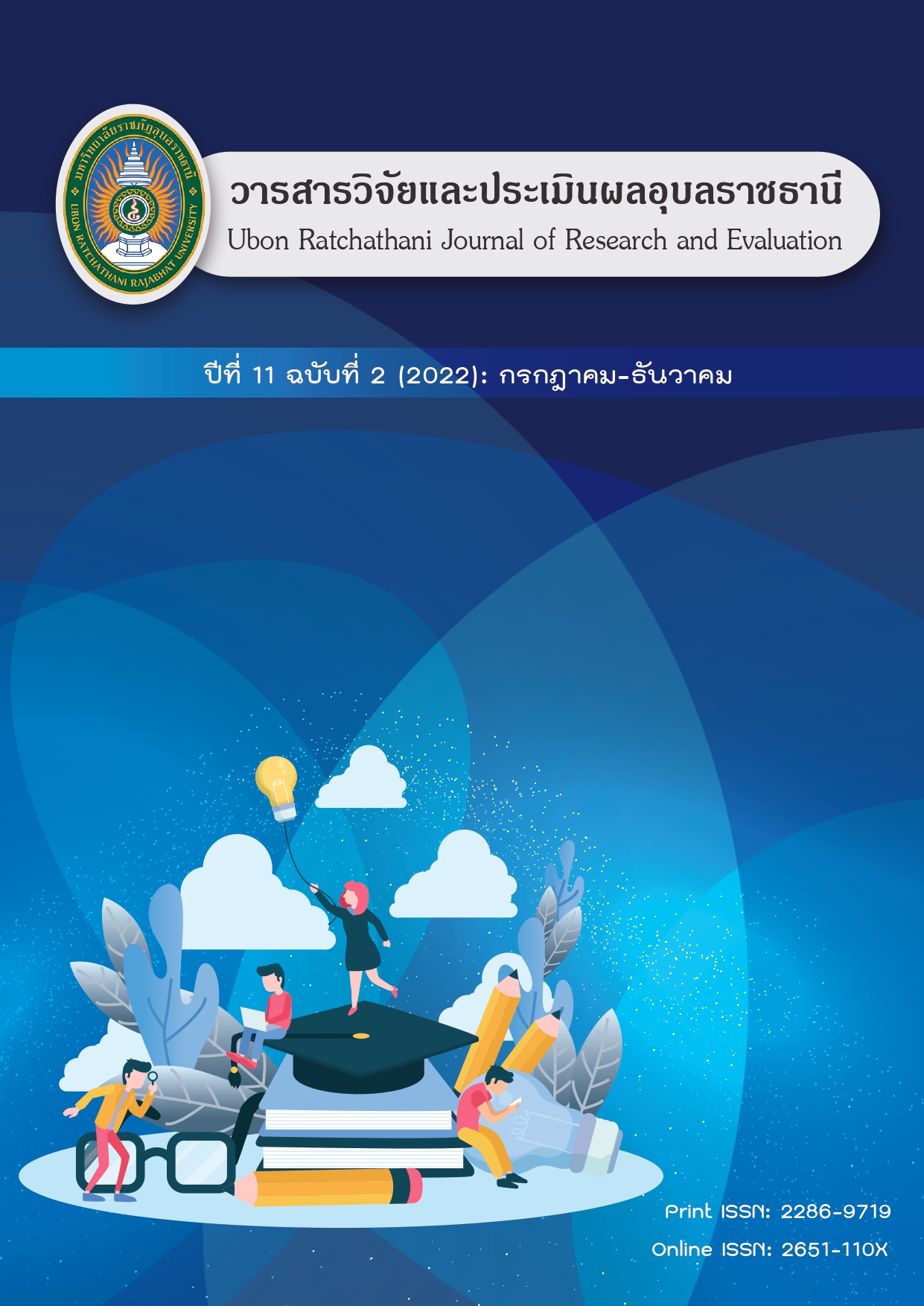The Development of Innovative Thinking Skills by using Research-Based Learning Management for Innovation of Mathayom Suksa 4 Students at Somdejphrayansangworn School in Patriarchal Patronage
Abstract
The purposes of this research were to 1) Study the development of innovative thinking skills using research-based learning management for innovation subjects, 2) Compare innovative thinking skills before and after the research-based learning activities, and 3) Study the student’s satisfaction towards the research-based learning management for Innovation subjects of Mathayomsuksa 4/1 students at Somdej Prayansangvorn School in the Patriarchal Patronage under the Office of Secondary Education Service Area 28, during semester 2 of the academic year 2019. Total of 28 students were selected by purposive sampling. The research model was based on Kurt Lewin's concept. The research instruments were 1) The research-based learning management plan, 2) The Innovative Thinking skills test, and 3) The satisfaction assessment form with research-based learning management, innovation subject. The statistics used in analysis were percentage, mean, and standard deviation. The research hypothesis was tested by using Wilcoxon sign ranks test.
The research findings were as follows:
- The Development of Innovative Thinking Skills by using Research-Based Learning Management consisted of three spiral circles. Each circle had three steps: 1) plan, 2) action and observation, and 3) reflection. After the operation, students have higher innovative thinking skills.
- The students had Innovative Thinking Skills higher than before learning at the statistical significance of .05 level.
- The overall students had a very satisfaction toward the research-based learning management. ( = 4.47, = 0.49)
References
กรมวิชาการ. (2543). การสร้างองค์ความรูด้วยตนเอง. กรุงเทพฯ: โครงการส่งเสริมและพัฒนาคุณภาพการศึกษา
ของสถานศึกษา.
Department of Academic Affairs. (2000). Self-Knowledge Creation. Bangkok: Project to promote and
Develop the educational quality of educational institutions. [in Thai]
กระทรวงศึกษาธิการ. (2551). เอกสารประกอบหลักสูตรแกนกลางการศึกษาขั้นพื้นฐานพุทธศักราช 2551 เรื่องแนว
ปฏิบัติการวัดและประเมินผลการเรียนรู้. กรุงเทพฯ : ชุมนุมสหกรณ์ การเกษตรแห่งประเทศไทย.
Ministry of Education. (2008). Documents for the Core Curriculum of Basic Education 2008 on the
practice guidelines measuring and evaluating learning outcomes. Bangkok: Agricultural Cooperative Association of Thailand. [in Thai]
_____________. (2558). สำนักคณะกรรมการการศึกษาขั้นพื้นฐาน. นโยบายสำนักงานคณะกรรมการการศึกษา ขั้นพื้นฐาน ปีงบประมาณ 2558. กรุงเทพ ฯ: ชุมนุมสหกรณ์การเกษตรแห่งประเทศไทย.
_____________. (2015). Office of the Basic Education Commission. Policy of the Office of the
Basic Education Commission, Fiscal Year 2015. Bangkok: Agricultural Cooperative Association of Thailand. [in Thai]
ธีรวุฒิ เอกะกุล. (2553). การวิจัยปฏิบัติการ พิมพ์ครั้งที่ 3. มหาวิทยาลัยราชภัฏอุบลราชธานี: สำนักพิมพ์ ยงสวัสดิ์
อินเตอร์กรุ๊ป จำกัด.
Akakul, T. (2010). Action Research. 3rd, Ubon Ratchathani Rajabhat University: Yong Sawat inter
group company limited. [in Thai]
พิมพ์พัชร พรสววรรค์. (2561). รูปแบบจินตวิศวกรรมแบบร่วมมือด้วยเกมิฟิเคชันบนสังคมคลาวด์เพื่อเสริมสร้าง
คุณลักษณะ นวัตกรและทักษะการคิดนวัตกรรม. (วิทยานิพนธ์ปรัชญาดุษฎีบัณฑิต สาขาวิชเทคโนโลยี สารสนเทศและการสื่อสารเพื่อการศึกษา) มหาวิทยาลัยเทคโนโลยีพระจอมเกล้าพระนครเหนือ.
Pornsawan, P. (2018). Gamification Collaborative Imagineering Model on Social Cloud for
Enhancing Innovator Characteristics and Innovative Thinking Skills. (Information Technology and Communication) King Mongkut’s University of Technology North Bangkok, 2018. [in Thai]
มนตรี จันตะมะ. (2562). การจัดการเรียนรู้โดยใช้วิจัยเป็นฐานที่ส่งเสริมสมรรถนะการประเมินและออกแบบ
กระบวนการสืบเสาะหาความรู้ทางวิทยาศาสตร์และทักษะการทำงานร่วมกันเป็นทีม เรื่อง การสืบพันธุ์ และการเจริญเติบโตของพืชดอก สำหรับนักเรียนชั้นมัธยมศึกษาปีที่ 5. (วิทยานิพนธ์การศึกษามหาบัณฑิต สาขาวิชาวิทยาศาสตร์ศึกษา) มหาวิทยาลัยนเรศวร พิษณุโลก.
Chantama, M. (2019). Research Based Learning approach for Enhancing the 11th grade students'
Competency in Evaluating and Designing Scientific Enquiry and Teamwork Skills about Plant Reproduction and Growth. (Thesis M.Ed. in Science Education) Naresuan University. [in Thai]
รุ่ง แก้วแดง. (2540). ปฏิวัติการศึกษาไทย. กรุงเทพฯ: แพร่พิทยา.
Kaewdang, R. (1997). Revolution in Thai Education. Bankok, Phraephittaya. [in Thai]
ศรัญญา ศิริวรศิลป์. (2557). การพัฒนาผลสัมฤทธิ์ทางการเรียน เรื่อง การผลิตสินค้าและบริการ และความสามารถ
ด้านกระบวนการวิจัยของนักเรียนชั้นมัธยมศึกษาปีที่ 2 ด้วยการจัดการเรียนรูโดยใช้วิจัยเป็นฐาน. (วิทยานิพนธ์ศึกษาศาสตรมหาบัณฑิต สาขาวิชาการสอนสังคมศึกษา) มหาวิทยาลัยศิลปากร, กรุงเทพฯ.
Siriworasin, S. (2014). The Development of Learning Achievement on Production of Goods and
Services and Research Abilities of Mathayomsuksa 2 students using Research–Based Learning. (Thesis Master Degree of Education Program in Teaching Social Studies) Silpakorn University, Bangkok. [in Thai]
สมเด็จพระญาณสังวร ในพระสังฆราชูปถัมภ์, โรงเรียน. (2561). แผนปฏิบัติการประจำปี 2561. ยโสธร:
โรงเรียนสมเด็จพระญาณสังวร ในพระสังฆราชูปถัมภ์
Somdejphrayansangworn in Patriarchal Patronage, School. (2018). Action plan 2018. Yasothon:
Somdejphrayansangworn in Patriarchal Patronage School. [in Thai]
สุวิมล ว่องวาณิช. (2549). การวิจัยปฏิบัติการในชั้นเรียน. พิมพ์ครั้งที่ 17. กรุงเทพฯ: จุฬาลงกรณ์ มหาวิทยาลัย.
Wongwanich, S. (2006). Classroom Action Research. 17th. Bangkok Chulalongkorn University. [in Thai]
Hart, S. (1996). Beyond Special Needs: Enhancing Children's Learning Through Innovative Thinking.
London: Paul Chapman Publishing.
IBSA. (2009). Developing innovation skills. Australia: Department of Education, Employment and
workplace Relations.
Kemmis, Stephen and Robin Mc Taggart. (1990). The Action Research Planer. 3rd ed. Victoria:
Brown Prior Anderson National Library of Australia Catalouging in Publication Data.
Downloads
Published
How to Cite
Issue
Section
License
Copyright (c) 2022 Ubon Ratchathani Journal of Research and Evaluation

This work is licensed under a Creative Commons Attribution-NonCommercial-NoDerivatives 4.0 International License.
1. บทความที่ตีพิมพ์ในวารสารนี้ได้มีการตรวจสอบการลอกเลียนงานวรรณกรรมแล้ว ไม่เกินร้อยละ 25
2. บทความที่ตีพิมพ์ในวารสารนี้เป็นข้อคิดเห็น ข้อค้นพบของผู้เขียนบทความ โดยผู้เขียนบทความต้องเป็นผู้รับผิดชอบต่อผลทางกฎหมายใด ๆ ที่อาจเกิดขึ้นจากบทความนั้น ๆ
3. บทความ ข้อมูล เนื้อหา รูปภาพ ฯลฯ ที่ได้รับการตีพิมพ์ในวารสารวิจัยและประเมินผลอุบลราชธานี ถือเป็นลิขสิทธิ์ของวารสารวิจัยและประเมินผลอุบลราชธานี หากบุคคลหรือหน่วยงานใดต้องการนำทั้งหมดไปเผยแพร่ต่อหรือเพื่อกระทำการใดๆ จะต้องได้รับอนุญาตเป็นลายลักษณ์อักษรจากวารสารวิจัยและประเมินผลอุบลราชธานีก่อนเท่านั้น และจะต้องมีการอ้างอิงวารสารวิจัยและประเมินผลอุบลราชธานี ฉบับนั้น ๆ ด้วย






